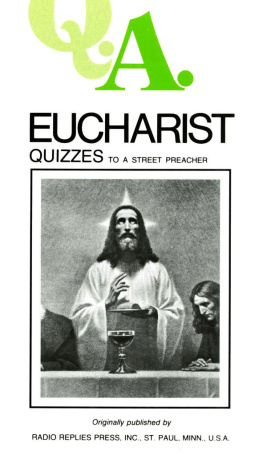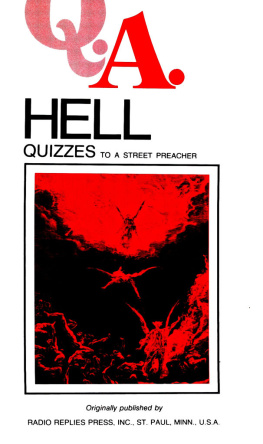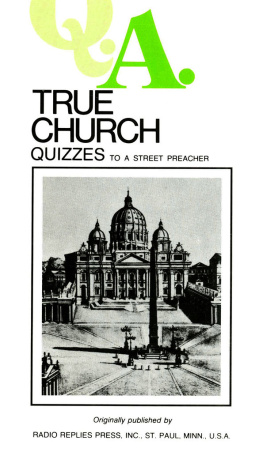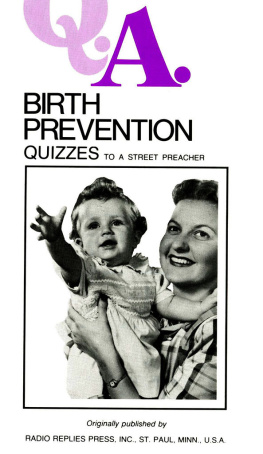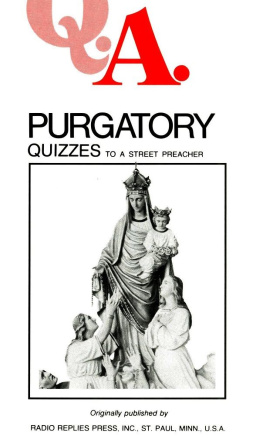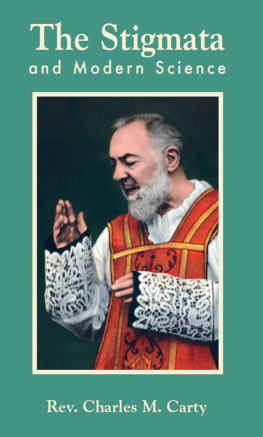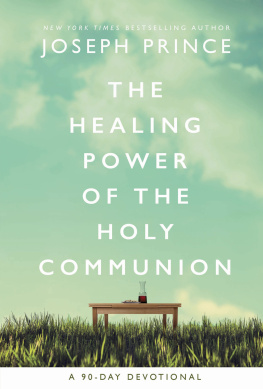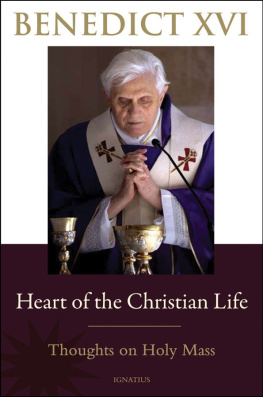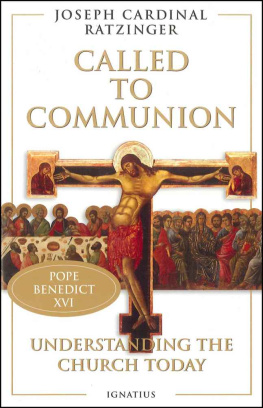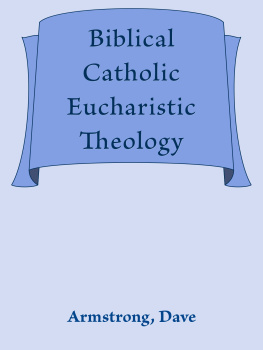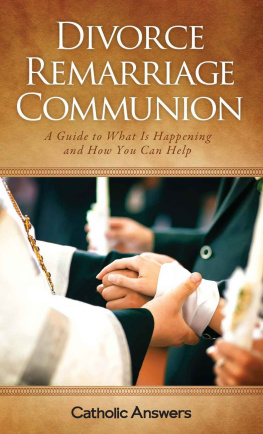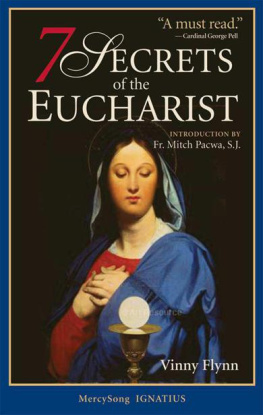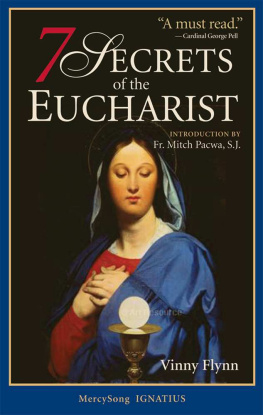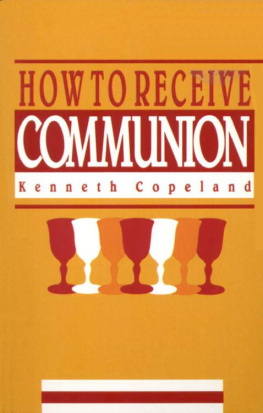Charles Mortimer Carty - Eucharist Quizzes to a Street Preacher
Here you can read online Charles Mortimer Carty - Eucharist Quizzes to a Street Preacher full text of the book (entire story) in english for free. Download pdf and epub, get meaning, cover and reviews about this ebook. year: 1992, publisher: TAN Books, genre: Religion. Description of the work, (preface) as well as reviews are available. Best literature library LitArk.com created for fans of good reading and offers a wide selection of genres:
Romance novel
Science fiction
Adventure
Detective
Science
History
Home and family
Prose
Art
Politics
Computer
Non-fiction
Religion
Business
Children
Humor
Choose a favorite category and find really read worthwhile books. Enjoy immersion in the world of imagination, feel the emotions of the characters or learn something new for yourself, make an fascinating discovery.
- Book:Eucharist Quizzes to a Street Preacher
- Author:
- Publisher:TAN Books
- Genre:
- Year:1992
- Rating:3 / 5
- Favourites:Add to favourites
- Your mark:
- 60
- 1
- 2
- 3
- 4
- 5
Eucharist Quizzes to a Street Preacher: summary, description and annotation
We offer to read an annotation, description, summary or preface (depends on what the author of the book "Eucharist Quizzes to a Street Preacher" wrote himself). If you haven't found the necessary information about the book — write in the comments, we will try to find it.
Charles Mortimer Carty: author's other books
Who wrote Eucharist Quizzes to a Street Preacher? Find out the surname, the name of the author of the book and a list of all author's works by series.
Eucharist Quizzes to a Street Preacher — read online for free the complete book (whole text) full work
Below is the text of the book, divided by pages. System saving the place of the last page read, allows you to conveniently read the book "Eucharist Quizzes to a Street Preacher" online for free, without having to search again every time where you left off. Put a bookmark, and you can go to the page where you finished reading at any time.
Font size:
Interval:
Bookmark:
Eucharist Quizzes
to a Street Preacher
Fr. Chas. M. Carty
&
Rev. Dr. L. Rumble, M.S.C.
Archiepiscopus Sancti Pauli.
Written by
Fr. Chas. M. Carty
&
Rev. Dr. L. Rumble, M.S.C.
Copyright 1976 by TAN Books and Publishers, Inc.
Originally published by
Fathers Rumble and Carty
Radio Replies Press, Inc.
St. Paul, Minn., U.S.A.
Complete and Unabridged
TAN Books
Charlotte, North Carolina
www.TANBooks.com
1976
CONTENTS
EUCHARIST QUIZZES TO A STREET PREACHER
1. Is your Blessed Sacrament still a cracker or a wafer?
The Blessed Sacrament is the Living Eucharistic Christ and it contains no trace of the substance of bread. The accidental qualities of bread are there, but veiled beneath them the living substance of Christ's Body and Blood, Soul and Divinity is present, the substance of bread having been converted into the body of Christ at the moment of consecration. We Catholics believe that this change does occur, that it can occur , and that Christ can be in the Sacred Host that has the appearance of a cracker or a wafer. "It is not His body ," is the echo of the ages, the repetition of the Jewish complaint, "This is a hard saying; who can hear it?" John VI, 61. Here then is the boast of fallible human reason. "Christ cannot be in the Host." "Who can hear it?" He alone who has a right idea of God, of His Truth and Majesty, has a correct estimate of a limited human intelligence. This doctrine is not for the proud. It is for the humble. And unless we become as little children, unless we know ourselves to be what we really are, it is not for us to believe this great mystery.
2. Christ becomes a piece of bread .
No. He does not become a piece of bread, nor does He become the appearance of bread. Christ remains Christ, and merely becomes present under the external signs of what was bread prior to the words of consecration. Christ has not been converted into bread , but the bread has been converted into the body of Christ, the external qualities of bread alone remaining. Reason has not a right idea of that against which it would protest. Even when it has a right idea of the doctrine, reason overlooks the fact that it is Almighty God who is the author of this wondrous gift. Arguing from their study of the universe, men urge that it is against the laws of nature, though no one has ever claimed that it is due to the laws of nature. We do not ask the laws of nature to do what they are not supposed to accomplish. In any case these men do not even know all the laws of nature, nor do they know that these laws can go only as far as they themselves desire that they should go. But they certainly cannot say that God is limited by the laws He Himself has established; and it is no created law of nature which is in operation here. It is God's own immediate work.
3. Your doctrine is believed only by fools .
It is useless to assert that only fools would believe such a doctrine, and then say that the doctrine is foolish because only fools believe it. Men must prove that those who do believe are fools from other and independent evidence, or else prove the doctrine is wrong itself. As a matter of fact, the assertion that no intellectual man believes in dogma today is a dogma in itself for which those who propound it offer no reason save that they believe it. Few would be prepared to rank a Pasteur, a Manning or a Newman, a Sir Bertram Windle or a Chesterton, or a Martindale, a John Moody or a Kent Stone as fools. St. Thomas Aquinas, whilst treating of the Blessed Sacrament in his Summa Theologica, was so far from suggesting a blind belief that he proposes and solves over 280 possible difficulties which might occur to the human mind, many of them far more profound than any living adversary today could even conceive. He anticipated by 200 years the absurd arguments of the revolutionists of the so-called Reformation, which has turned out to be the world's deformation .
4. Well, I can't believe your doctrine because I cannot understand it .
If so, then to be logical, besides crying, "Away with the Eucharist," we should also cry, "Away with the idea of a man being God. Away with Christianity; we do not comprehend it. Away with Hell; we have never seen it. Away with the human soul; we have never touched one. Away with matter and substance; they baffle us. Away with the universe. Away with God; and so on, from degree to degree, from despair to despair, even to the suicide of reason." Perhaps your credulity leads you to swallow the notion that this world evolved out of an eternal nebula; that man is the product of organic evolution, etc. Let any man publish a theory and you, no doubt, would swallow it hook, line and sinker with whole-hearted adhesion, provided God be not mentioned. Offer to prove it, you reply, "No need. We believe it, it rings true." Yet, mention God, offer to show the proofs of Christian doctrineyou will not even look at them. Truly, St. Paul was right in his prediction, "They will heap to themselves teachers, having itching ears: and will indeed turn away their hearing from the truth, but will be turned unto fables." (2 Tim. IV 3-4.)
5. Can Christ be in the Host?
Yes. Nor is finite human reason the criterion as to what God can or cannot do, when the truth proposed is not against reason, but simply above and beyond its capacity. We know that, if God tells us a truth which human reason could not discover by its own unaided powers, that truth is bound to seem extravagant. The presence of Christ under the appearances of bread is His work and the very soul and bond of the whole architecture of Catholic and Christian doctrine. Human reason could not invent it, nor can reason without revelation prove it . For if this doctrine were a work of reason it might be fully comprehensible to us, but it would be a natural philosophy, not a supernatural religion. Reason alone tells us that the Living Christ could be in the Host, did God so desire.
6. Do you believe the consecrated Host to be the body of Christ because of any signs in the Host itself?
We do not believe in Blessed Sacrament because we can realize or visualize the full truth. Even a priest could not distinguish a consecrated Host from an unconsecrated wafer unless he were told which of the two had been consecrated. The consecrated Host looks like bread, it tastes like bread, it nourishes like bread. There is no difference for priest and layman. At the altar the priest has no experience at all of a change. Yet, after consecration, there is no substance of bread remaining. The Body, Blood, Soul and Divinity of Christ are present. Human reason alone tells us three things:
(1) The God who created the universe with a mere act of His will is infinitely powerful, and not to be limited by the degrees of a created finite intelligence.
(2) God is Truth Itself, and could not possibly tell us a lie.
(3) The Gospels are true history. No documents have had such a thorough sifting. They have survived a deeper critical study, a more searching analysis than any other writings have had to undergo, and that not only by men of good will, but by the very enemies of Christianity.
These three things are clear to our human reason. Unless a man receives additional light from God he will be unable to proceed, to grasp the full significance of the truths contained in the Gospels. That additional light is given by the Church that gave the Bible to the world. As reason told us three things, reason and Faith combined also tell us three things:
(1) The historical Person described in the Gospel, and known as Jesus Christ, is Almighty God, with all divine attributes.
(2) This Christ taught the doctrine of the Blessed Sacrament as clearly as it is possible to state it.
(3) He also established an infallible Church, which guarantees to maintain the judgment of reason and Faith in accordance with God's knowledge of this matter.
Next pageFont size:
Interval:
Bookmark:
Similar books «Eucharist Quizzes to a Street Preacher»
Look at similar books to Eucharist Quizzes to a Street Preacher. We have selected literature similar in name and meaning in the hope of providing readers with more options to find new, interesting, not yet read works.
Discussion, reviews of the book Eucharist Quizzes to a Street Preacher and just readers' own opinions. Leave your comments, write what you think about the work, its meaning or the main characters. Specify what exactly you liked and what you didn't like, and why you think so.

